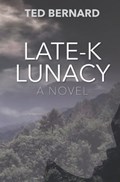"Rachel Carson's Silent Spring opens with a dystopian portrait of a fictitious town dying from pesticides. Mocked by corporate agribusiness, her non-fiction best-seller became the generative force for the modern environmental movement. Late-K Lunacy follows in this tradition with fiction, this time the threat to human and ecological life being a climate change-induced pandemic. It will frighten the complacent and arm climate justice advocates. Ted Bernard has an engaging and imaginative gift for ecology-based fiction." — H. Patricia Hynes, retired Professor of Environmental Health, author of The Recurring Silent Spring (Pergamon)
"A devastatingly truthful work of ecology-based fiction and a gripping story of the coming-of-age of a group of post-carbon Millennials. Much more than an ecological dystopia, Late-K Lunacy is a splendid evocation of world going into – and eventually coming out of – an ecological crisis, as Holling's ecological cycles are characterized by both collapse and recovery, like a never-ending Möbius strip." — Fikret Berkes, author of Sacred Ecology (Routledge)
"Panarchy invites us to conceive of the world as a vast interlocking
set of interactive systems that pass through phases over time. If we can thoroughly
understand the implications of panarchy's dynamic, we can perhaps begin to avoid
behaviors that quicken the progression of human and ecological systems toward
collapse. That is the challenge before us now." — Katja Nickleby, in Late-K Lunacy.

